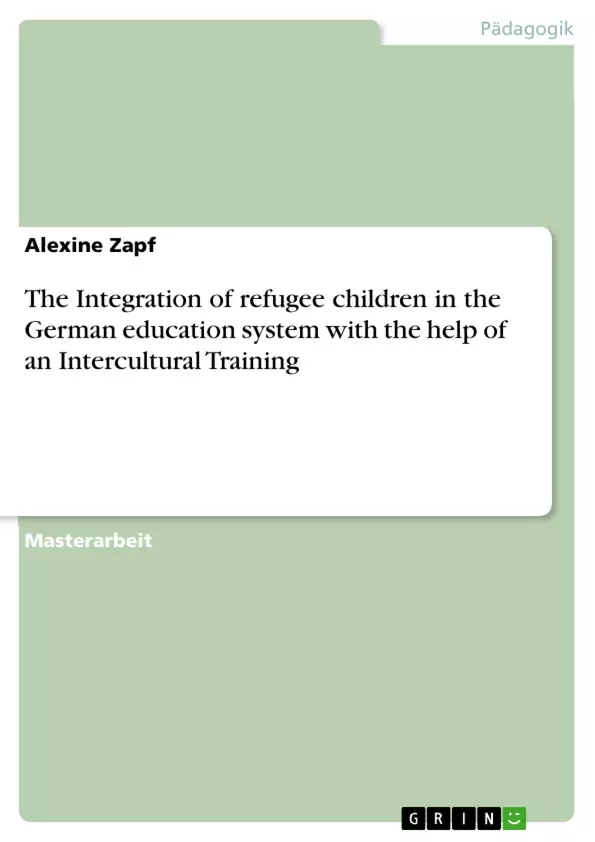This dissertation presents the background and context to the process whereby very large numbers of child refugees are being taught in German schools today. It does this in order to identify and specify the various issues this movement of non-native young people into the German educational system has raised, in terms of how to integrate them into the existing system and culture.
By delineating the problems and difficulties involved, it sets out the need to develop training materials that can support such refugee children and effectively promote their integration into the German school system and society and further personal development. In order to get the needed data, an online questionnaire focusing on the teacher’s perspective was designed. It goes on to present materials designed to facilitate this process, this being a key objective of this study. In the context of this study, the training material could not be tested, but it in this way the dissertation emphasises that intercultural training can be a great help in the integration of refugees, whether they are young children or adults.
Since the migrant crisis began in 2015, over three million refugees have travelled across the Mediterranean Sea or overland to Europe in search of a new and safe home. They are fleeing violence against civilians, and severe violations of human rights and international laws. Syria, one of the most problematic home countries for refugees, generated 6.7 million fugitives, as war crimes and human rights abuses are common. The Assad regime has systematically cut medical and food supplies to the population. Terrorist and bomb attacks on residential areas are not uncommon. Moreover, air raids by the USA, Russia and Turkey threaten the lives of millions of civilians in the country. ISIS (Islamic State of Iraq and Syria) has sought to spread their ideology, uses terrorist attacks, abductions and public torture to achieve their goal of creating a new state, forcing millions of people to flee their home countries. According to UNHCR over 2.1 million people were displaced inside Iraq, as of April 2018. Other travelled from south and east Europe, the greater Middle East and Africa.
Inhaltsverzeichnis
- Introduction
- Literature Review
- Refugees
- German education system and refugees
- German education system
- Refugees in the German education system
- Refugees' problems
- General problems for refugees in the host country
- Problems for refugees in the education system
- Methods of resolution
- Intercultural Training
- Intercultural communication
- Intercultural Training
- Conclusion
- Objectives of the study
- Methodology
- Online questionnaires
- Study setting and participants
- Results of the questionnaires
- Needs analysis
- Training materials
- Letter to the teacher
- Session 1: Change in perspective
- Session 2: Raising awareness on diversity
- Session 3: Language and culture
- Session 4: Knowledge about different cultures
- Online questionnaires
- Discussion
- Conclusion
Zielsetzung und Themenschwerpunkte
Diese Dissertation befasst sich mit der Integration von Flüchtlingskindern in das deutsche Bildungssystem. Das Hauptziel ist es, die verschiedenen Herausforderungen und Probleme zu identifizieren, die mit der Einwanderung von nicht-deutschen Kindern in das deutsche Bildungssystem verbunden sind, sowie geeignete Trainingsmaterialien zu entwickeln, um diese Kinder zu unterstützen und ihre Integration in das deutsche Schulsystem und die Gesellschaft zu fördern.
- Herausforderungen bei der Integration von Flüchtlingskindern in das deutsche Bildungssystem
- Entwicklung von Trainingsmaterialien zur Unterstützung von Flüchtlingskindern
- Interkulturelle Kommunikation und Training im Kontext der Flüchtlingsintegration
- Die Bedeutung von Sprache und Kultur im Integrationsprozess
- Die Rolle des Bildungssystems bei der Integration von Flüchtlingskindern
Zusammenfassung der Kapitel
- Kapitel 1: Introduction: Das erste Kapitel führt in das Thema ein und beschreibt den Hintergrund der Flüchtlingskrise und die Herausforderungen, denen Deutschland im Umgang mit der hohen Zahl an Flüchtlingen gegenübersteht. Es beleuchtet die Gründe für Flucht und die Schwierigkeiten bei der Integration von Flüchtlingen in das deutsche Bildungssystem.
- Kapitel 2: Literature Review: Dieses Kapitel befasst sich mit der theoretischen Grundlage der Flüchtlingsintegration. Es definiert den Begriff der Migration und erläutert die Herausforderungen, die Flüchtlinge im Aufnahmeland und insbesondere im Bildungssystem erleben. Es werden verschiedene Methoden zur Lösung der Probleme sowie die Bedeutung von interkultureller Kommunikation und Training behandelt.
- Kapitel 3: Objectives of the study: Dieses Kapitel präsentiert die Forschungsziele der Dissertation. Es beschreibt die Notwendigkeit von Trainingsmaterialien, um Flüchtlingskinder bei der Integration in das deutsche Bildungssystem zu unterstützen.
- Kapitel 4: Methodology: Dieses Kapitel erläutert die Methodik der Forschung. Es beschreibt die Durchführung einer Online-Befragung von Lehrkräften sowie die Entwicklung von Trainingsmaterialien auf der Grundlage der Ergebnisse der Befragung. Es werden außerdem die einzelnen Module der Trainingsmaterialien vorgestellt.
- Kapitel 5: Discussion: Dieses Kapitel diskutiert die Ergebnisse der Forschung und beleuchtet die Relevanz von interkulturellen Trainings für die Integration von Flüchtlingskindern.
Schlüsselwörter
Die Dissertation befasst sich mit den Themen Flüchtlingsintegration, Interkulturelle Kommunikation, Interkulturelles Training, Bildungssystem, Deutsch lernen, Kultur, Diversität, Vorurteile, Stereotype, Inklusion und Exklusion.
- Quote paper
- Alexine Zapf (Author), 2019, The Integration of refugee children in the German education system with the help of an Intercultural Training, Munich, GRIN Verlag, https://www.grin.com/document/987106



